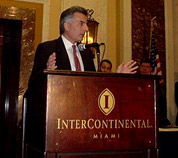Miami, Florida • December 12, 2003
Presentation Delivered By
Alvaro Vargas Llosa
| Alvaro Vargas Llosa was the recipient of the 2003 Freedom of Expression Award granted by the Florida-based Organization of Ibero-American Journalists, a group of media executives and academics involved with issues relating to freedom of the press across the Western Hemisphere. The ceremony at which the award was granted took place at the Intercontinental Hotel, in Miami, on Friday, December 12th, 2003. |

Alvaro Vargas Llosa at news conference. |
“Let me share with you a few quick remarks about the situation of the press in Latin America. In most countries, journalists are forced, by virtue of the pressures they face from governments and other sources of violence, to devote much time to discussing their own situation. Politics has turned journalism into a self-centered activity that is fascinated with its own nature. That is why there are now hundreds of press organizations and university departments holding media-related events, putting out statements and writing letters of protest on behalf of the journalistic profession across the hemisphere.
“The consequence has been a blurring of the boundaries between journalism and activism. It is now usual for a journalist in Venezuela, Peru or Colombia to be, at the same time, an activist. Defending the right to express ourselves has become more urgent and time-consuming than the actual act of writing or broadcasting a story. We have become reluctant “emergency politicians.” Why? For the simple reason that the very institutions supposed to protect our rights have become the primary sources of the threat against those rights.
“This is true of extreme cases like Cuba, but also of countries like Mexico and Peru, in which the transition to democracy was supposed to bring about a radical variation in the nature of the business. I will mention, in the case of Cuba, the fact that some 70 people who make up the “Independent Cuban Press” movement, among them Raúl Rivero, are in jail. I feel particular attachment to their cause because, a decade ago, when I was at the Miami Herald Publishing Company, I had the honor of being one of the first to print their material. I recall the skeptical reception at the time; the dominant opinion in Miami held that, because they had chosen to stay in Cuba, they were nothing but government agents. Time has proven that their efforts to open up a space for the journalistic profession were genuine, and it has done so in the cruelest of manners. They and their families have consequently become beacons of freedom in the eyes of the wider society. Through those journalists, other citizens also seek an open space.
“Something similar is happening in Venezuela, where the government of President Chávez subjects most TV stations and print media to a daily harassment that includes visits from the notorious thugs of the so-called Bolivarian Circles. A group of women journalists, among them Patricia Poleo and Marta Colomina, have spent the last two years defending themselves against routine attacks with petrol bombs, judicial persecution and smear campaigns. Their wonderful journalistic work is now overshadowed by their presence in street marches and opposition rallies, as well as by efforts to put together a referendum to oust the President. Their skills, but especially their symbolism, have become an essential part of the grass-roots effort to build a civil society capable of withstanding the force of the state. Although they are constantly accused of mascarading as journalists to engage in politics, the truth is exactly the opposite: they are journalists mascarading as politicians in order to save journalism—and the type of society that a free press makes possible.
“My own case—to come to the subject of Peru—is infinitely less heroic but equally illustrative. After the current President unleashed a barrage of legal and political acts of intimidation against me for asking that the updating of the nation’s fighter jets be subjected to public scrutiny, I was forced to go underground for almost a year. My entire time was taken up defending my right to write and speak. This brought to the surface issues regarding the boundaries that separate journalism from political action. But the conclusion was always the same: authoritarianism takes away the journalist’s choice.
“Other Peruvian journalists who are critical of the authorities, such as Juan Carlos Tafur and Rosa María Palacios, have recently been the object of judicial harrasment (in one case) and eavesdropping (in the other).
“The plight of journalists in this hemisphere is a cause for both indignation and celebration. Indignation at the way in which governmets have forced them to transit from journalism to activism, and joy at the fact that in undertaking such a transit they make us all, every morning, a little freeer than we were the night before.”

Alvaro Vargas Llosa at news conference. |
|
 |
 |
| Renowned author Mario Vargas Llosa, Patricia Vargas Llosa, Susana Vargas Llosa, Alvaro Vargas Llosa at awards dinner. | Mario Vargas Llosa, Alvaro Vargas Llosa and George Alessandri II, President, U.S. Foreign Trade Institute. |













